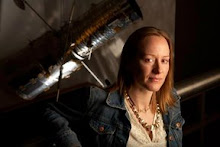
Last night Grama and I were watching the eclipse through her window, and I found myself wondering, what does it look like from up there? Since no one has ever stood on the moon during a lunar eclipse (which I suppose would be called a "transit" if you were actually standing on the moon watching the Earth pass in front of the sun), I have free rein in speculating what it would look like, and I'm pretty sure it would be an experience to wound the most callous breast.
First of all, a lunar eclipse is what you get when the moon passes through the Earth's shadow, as depicted in this image stolen from space.com:

If we were standing on the moon looking up at the Earth, there are a few things that we'd immediately be amazed by. For example, the Earth does not rise and set in the lunar sky. The moon is tidally locked to the Earth, so that the same side of the moon always faces us. The Earth sits in one spot in the moon's sky, a spinning globe, while the sun rises and moves across the sky--sometimes passing directly behind the Earth--once per month. The Earth is also MUCH bigger in the moon's sky than the moon is in the Earth's sky, and this is not an optical illusion. The Earth is bigger by almost a factor of 4. And thanks to all the clouds, the Earth is much more reflective than the dark lunar surface--which is about as reflective as blacktop. So, imagine looking up, seeing a full Earth that is the size of four full moons, and up to thirty times as bright. Neat, huh?
Similarly, if we were standing on the moon and watching a "transit" of the Earth in front of the sun, the Earth would appear about four times the size of the sun. However, the Earth would not be big and bright and full--it would be a dark night-side Earth, with street lights faintly outlining the continents as they slowly rotate from west to east. The Earth sits as a huge dark sphere, next to a bright yellow sun, in a black starry sky. As the sun passes behind the disk of the Earth, our moonscape darkens, is bathed in red light, and instantly cools by hundreds of degrees. A thin dark red circle of light outlines the Earth--this is sunlight refracting through the thin layer of atmosphere. Random flashes of light sparkle on all sides of the Earth--sunlight reflecting off of the solar panels of some 3000 spy, weather, and communications satellites. Behind the Earth, the Solar corona waves in all colors and directions, like the wings of an angel, keeping us while we sleep.
Keep me as the apple of the eye,
hide me under the shadow of thy wings.
Be merciful to me,
for my soul trusteth in thee;
yea, in the shadow of thy wings will I make my refuge,
until these calamities be overpast.



















 The initial conspirators from left: Pam Augustyn (hydroponic tomato grower), Brad Igl (organic patato farmer), Alex Crockford (organic dairy farmer), Steph Bures (organic dairy farmer), Brian Igl (organic potatoes), myself (self-appointed poster child for how awesome it is to live in Wisconsin), and Vicki Adamski (maple syrup farmer).
The initial conspirators from left: Pam Augustyn (hydroponic tomato grower), Brad Igl (organic patato farmer), Alex Crockford (organic dairy farmer), Steph Bures (organic dairy farmer), Brian Igl (organic potatoes), myself (self-appointed poster child for how awesome it is to live in Wisconsin), and Vicki Adamski (maple syrup farmer).


















 I have also completely renounced any tendency to take pictures of things like the rising full moon while driving, as this State Trooper can affirm. Now I always make sure the passenger drives while I do that.
I have also completely renounced any tendency to take pictures of things like the rising full moon while driving, as this State Trooper can affirm. Now I always make sure the passenger drives while I do that. 


